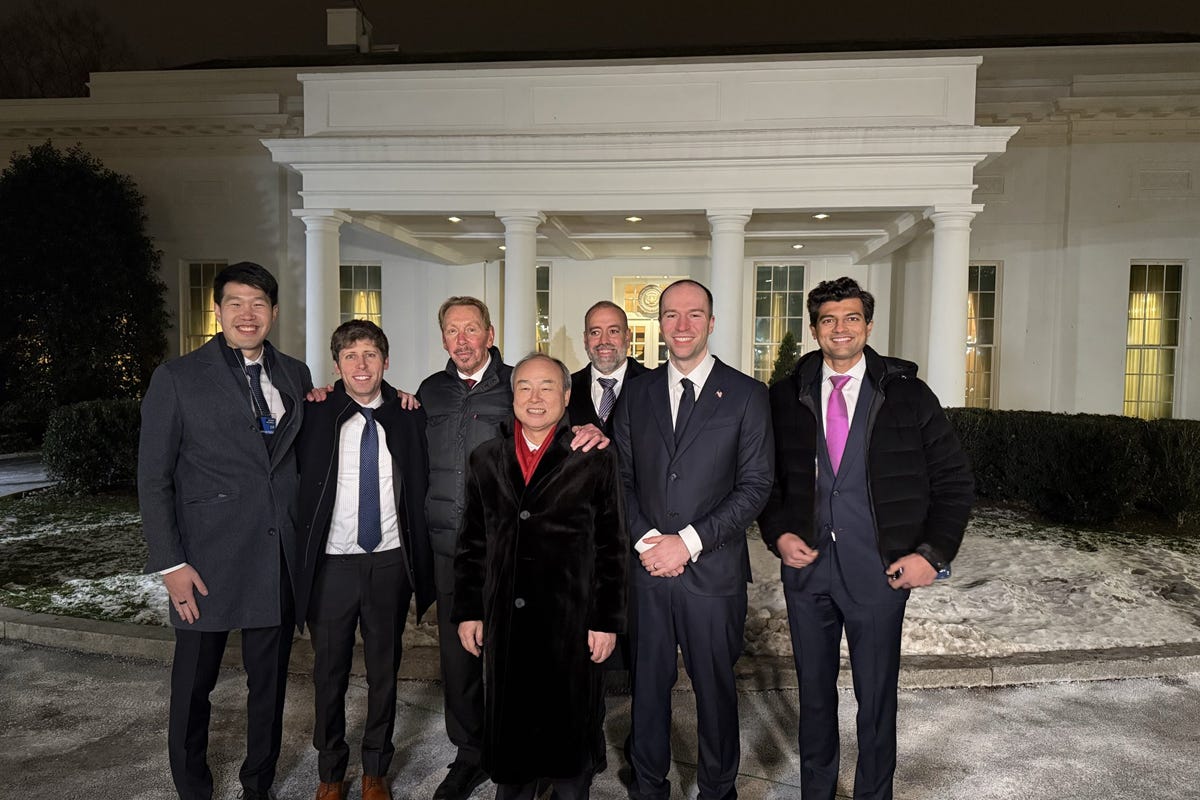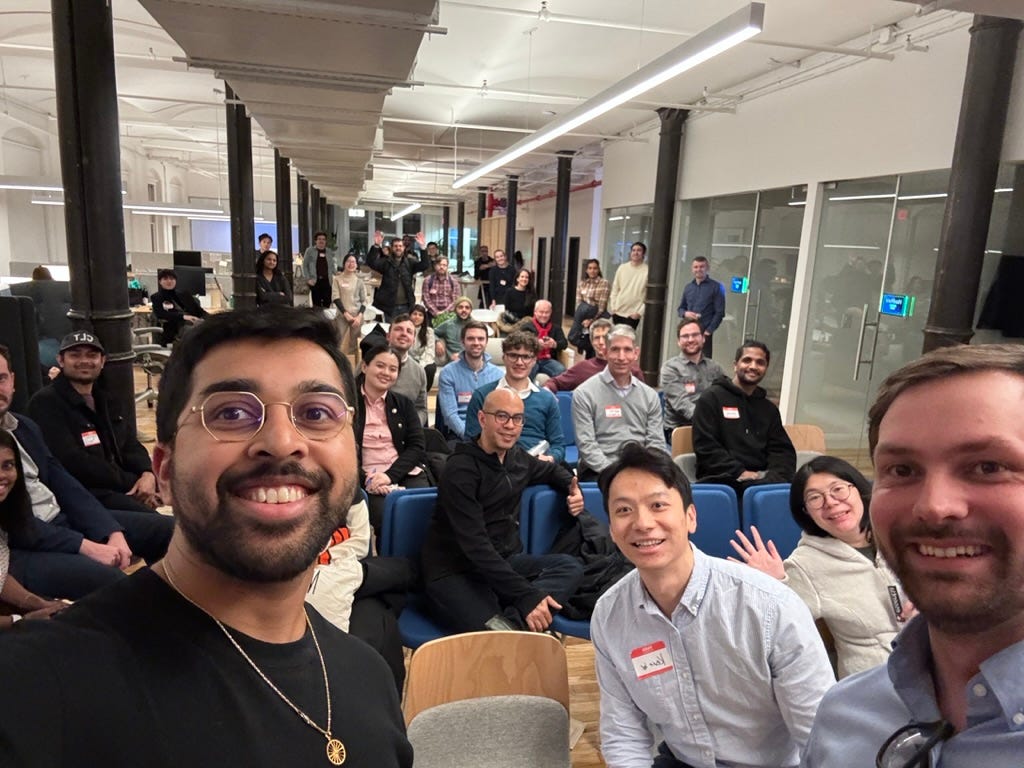Upcoming Events
🌁 SF Bay Area
Sat, Feb 15th: 🧠 GenAI Collective 🧠 Hike at SF Land’s End 🥾
Tue, Feb 18th: 🧠 GenAI Collective 🧠 DeepSeek for Founders 🐳
🗓️ Hungry for even more AI events? Check out SF IRL, MLOps SF, or Cerebral Valley’s spreadsheet!
🗽New York
Thu, Feb 27th: AI/ML makers unplugged with Google Cloud
As part of the event, we’re inviting our community members to share their work in a short, 15-minute lighting talk. If interested, feel free to fill out this form for a chance to get involved!
The New York team is also hiring! We are seeking passionate enthusiasts to join us supporting event planning, sales and sponsorships, and marketing . Apply here!
🌆 Chicago, IL
Tue, Feb 18th: AI Innovations & Industry Networking Night 🧠
🏛️ Washington DC
Wed, Feb 12th: DC Tech Party #3: The Match Lab 🧪
Fri, Feb 21st: AI Soirée: The Human Alignment Question
🎲 Las Vegas
Tue, Mar 11th: 🧠 GenAI Collective x HumanX 🎲 AI Leaders Convergence
Operator: OpenAI’s First Step Toward True AI Agents
The AI landscape just shifted—again. OpenAI has unveiled Operator, an autonomous AI agent that can browse the web, make purchases, and complete multi-step tasks without user intervention. This marks the mainstream signal towards ‘Agentive AI’, or AI that goes beyond knowledge and into action.
What makes Operator different:
Breaking the Barrier to AI Agents: Operator represents a shift from traditional AI models to AI that can complete real-world tasks through natural language.
External Integrations and the Web2 Takeover: Operator is seamlessly embedding itself into the existing internet ecosystem, integrating with services like DoorDash, Instacart, and Uber. It’s the bridge between AI and Web2, unlocking a new era of automation.
Security & Control: Built-in safeguards include user approvals, real-time threat detection, and a “takeover mode” for sensitive operations.
The Bigger Picture: OpenAI’s nonstop drops continue. First Stargate, now Operator. Plus, o3-mini is expected to drop later this month.
AI has officially moved into level 3, in the race towards AGI. Check out the Operator Demo for a glimpse into the future—one where AI doesn’t just help us, but actively works for us.
OpenAI’s Stargate: The $500B Infrastructure Play That Shows the U.S. Is All-In on AI
In what is by far the largest AI investment ever, OpenAI is launching The Stargate Project—a $500B AI infrastructure initiative with SoftBank, Oracle, and Nvidia. The sheer scale of this investment signals that the U.S. government and its corporate allies are fully committing to AI as the defining technology of the 21st century.
Key details:
Immediate Investment: $100B is already in motion, with Texas as the first site for next-gen AI data centers.
Job Creation: OpenAI is aiming for hundreds of thousands of jobs, countering fears of AI-driven displacement.
Strategic Timing: The move comes just after Biden’s AI safety regulations were repealed, shifting the focus from oversight to rapid development.
What this means: OpenAI isn’t just building better models—it’s constructing the entire ecosystem necessary for AGI dominance. While Microsoft has been a key driver of its growth, it’s clear that OpenAI can’t rely on Microsoft alone for long-term expansion. However, as we’ve seen this week, even massive investments don’t always translate into guaranteed success.
DeepSeek’s R1 Forces a Reckoning in AI Funding
Speaking of success with miniscule investments, DeepSeek shattered expectations and caused the biggest single-day tech stock crash. Their R1 model delivers open-source o1-level performance at a fraction of the cost (1/30th), forcing the world to reconsider the economics of AI development.
Why it matters:
High-Performance, Low Cost: R1 was trained for just $5.6M—proving state-of-the-art AI doesn’t require billion-dollar budgets.
Market Fallout: Nvidia’s stock plummeted 10.5%, sparking a broader selloff across Broadcom (-10.2%), AMD (-4.5%), Qualcomm (-3%), and ASML (-11.1%).
A New Paradigm: If a Chinese company can recreate OpenAI’s o1 advanced reasoning model in under two months, as a side project, it raises serious questions about the massive investments U.S. firms and governments are making. Are Silicon Valley valuations overinflated? What does this mean for the future of AI funding?
Open Source vs. Proprietary AI: DeepSeek’s approach is an open-source nod, offering models for experimentation on Hugging Face and GitHub, providing a counterbalance to proprietary AI development.
For Nvidia and other semiconductor giants, the message is clear: the rules of AI are changing fast, and adaptation is the only option.
It’s almost surreal to realize that the AI arms race we’ve been bracing for—monumental in scope—has just swerved into uncharted territory. With Operator, OpenAI unveiled an AI that can act on our behalf: ordering groceries, summoning rides, even handling complex tasks without human oversight. Meanwhile, the $500B Stargate initiative stands as a staggering monument to the West’s strategy of massive investment fueling AI supremacy. Yet, right at the apex of this frenzied buildup, DeepSeek crashes the scene like an unforeseen thunderbolt: a Chinese startup upending cost assumptions by training its flagship model at a fraction of the billions once deemed inevitable for cutting-edge AI dominance. In one swift move, they’ve proved that innovation can trump brute-force spending.
Validating David Cahn’s “$600B Question” forewarnings of bloated AI infrastructure, DeepSeek’s lean, open-source ethos hints that colossal GPU farms might be overkill. Frankly, the open source community and international competition such as China may be rewriting the rules, building with agility, stealth, and minimal overhead. If Chinese innovators keep circumventing hardware restrictions and capital-heavy data centers, we could witness a tectonic shift in who truly commands the AI future next.
Events Spotlight
🗽New York
We kicked off 2025 with an incredible Research Roundtable featuring thought-provoking discussions on advanced AI agents and algorithmic reasoning. Our distinguished speakers and engaged audience created an atmosphere of deep technical exploration and collaborative learning.
Key Highlights:
Professor Zhou Yu (Columbia University) shared great insights into agentic architectures & practical implementation
Konstantin Lopyrev (Google) deep dived into the techniques behind Monte Carlo Tree Search
Rich discussions on the evolution beyond traditional language models
The event fostered engaging conversations around:
Mathematical reasoning approaches in modern AI systems
Architectural innovations in specialized AI agents
Future directions for AI development and implementation
We're grateful to our speakers and attendees for making this such an enriching experience!
Join the Team! 👷
The GenAI Collective is growing rapidly and we’re looking for passionate, visionary community builders to join our team. If you want to join a team of 50+ organizers helping to shape the future of AI, we have tons of exciting ways to get involved! Read more about each opportunity below and learn what you can create with this vibrant community!
About Aqeel Ali
Aqeel is an AI startup operations veteran and 2x founder. At the GenAI Collective, he focuses on co-leading the newsletter and systems building. When not immersed in AI, startup operations, or crafting satirical jokes, Aqeel “delves” into psychology and human creativity! 🎨
About AJ Green
AJ is the Founder & CEO of AI Advantage Agency, WCYP Chairman, and Chapter Lead for GenAI Collective Portland. Former athlete turned tech entrepreneur, AJ is a builder and superconnector on a mission to make AI the great equalizer—helping startups scale and turning disruption into opportunity.








